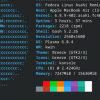Open source release takes Linux rootkits mainstream
The art of burying invisible malware deep inside a Linux machine is about to go mainstream, thanks to a new open-source rootkit released Thursday by Immunity Security, a firm that supplies tools for penetration testers.
When implemented, Immunity's DR, or Debug Register, makes backdoors and other types of malware extremely difficult to detect or eradicate. It's notable because it cloaks itself by burrowing deep inside a server's processor and availing itself of debugging mechanisms available in Intel's chip architecture. The rootkit, in other words, mimics a kernel debugger.
By exploiting a CPU's native ability to generate interrupts, DR escapes some of the pitfalls that have visited more traditional types of rootkits, which modify an operating system's system call table. That's of increasing importance as more and more Linux distributions make it harder to make changes to the syscall table and rootkit detection programs such as chkrootkit and rkhunter actively check for such modifications.









































































